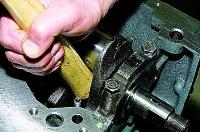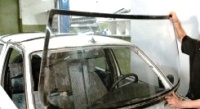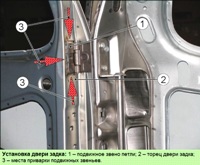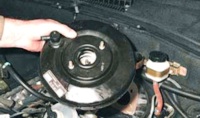When the engine is running, a good cooling system maintains optimal temperature conditions
A malfunction in the cooling system can cause the engine to overheat.
If you skip this moment, unpleasant consequences may arise: breakdown of the head gasket, warping of the head and, as a result, difficult engine repairs.
In the instrument cluster of any car there is a coolant temperature gauge. If the engine overheats, the pointer needle approaches the red zone.
Checking the cooling system
At the first signs of overheating, if the arrow of the temperature gauge has gone into the red zone, but no clouds of steam are escaping from under the hood, fully open the heater cock and the air intake control damper, turn on the heater electric motor at maximum speed.
Turn on the hazard warning lights, depress the clutch pedal and, using the momentum of the car, try to carefully move to the edge of the roadway and stop as far to the right as possible at the curb, and if possible, outside the roadway.
Let the engine run for a couple of minutes at normal idle with the heater on full blast.
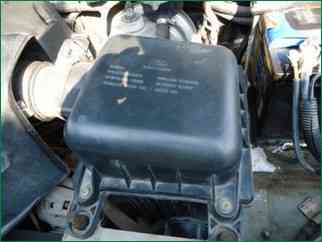
Do not stop the engine immediately! The only condition is to maintain the tightness of the cooling system.
If a hose bursts or jumps off, or there is another leak, except for the release of fluid from under the cap of the expansion tank, the engine will have to be stopped immediately!
After the overheated engine stops, local overheating of the coolant begins at the points of contact with the most heat-stressed engine parts and the formation of vapor locks. This phenomenon is called "thermal stroke".
- 1. Stop the engine.
- 2. Open the hood and inspect the engine compartment.
Find where the steam is coming from.
When inspecting the engine, pay attention to the presence of coolant in the expansion tank, the integrity of the rubber hoses, radiator, thermostat.
Never open the cap of the expansion tank immediately.
The liquid in the cooling system is under pressure, when the plug is opened, the pressure will drop sharply, the liquid will boil and its splashes can scald you.
If you want to open the cap of the expansion tank on a hot engine, first put a thick thick rag on top and only then carefully turn the cap.
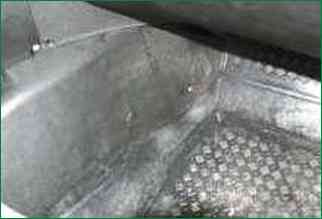
Look under the instrument panel for leaks or traces of coolant flowing from the radiator or heater valve.
If coolant leaks are found, a burst hose can be temporarily repaired with masking tape.
A radiator, thermostat or heater leak is quite difficult to fix on the spot, so in such a situation it is necessary to add water to the cooling system and carefully monitor the temperature gauge while driving, periodically restoring the level in the cooling system.
Prolonged use of water instead of antifreeze leads to the formation of scale in the engine cooling system, deterioration of its cooling and, as a result, a reduction in resource.
Never add cold water to an overheated engine.
Let the engine cool down with the hood open for at least 30 minutes.
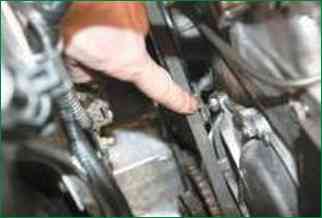
If there is no coolant leak, check if the alternator drive belt is intact and how tight it is (it also drives the water pump at the same time).
Replace a torn belt or adjust its tension.
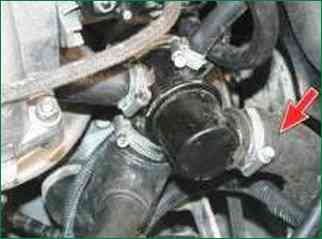
The engine can overheat if the thermostat fails, which controls the flow of fluid in the cooling system through or past the radiator (to speed up the warm-up of a cold engine).
To check the thermostat, on a warm engine, feel the temperature of the lower hose connecting the engine to the radiator.
If the lower radiator hose is cold bottom - the thermostat is faulty, there is no circulation through the radiator.
An important role in ensuring optimal temperature conditions is played by the expansion tank plug valve.
It maintains an excess pressure of at least 0.1 MPa (1.1 kgf / cm 2 ) in the system.
In this case, the boiling point of water rises to 120 ° C, and antifreeze to 130 ° C.
Unfortunately, when the valve is stuck in the closed position during overheating, a significant excess of overpressure occurs [more than 0.2 MPa (2 kgf / cm 2 )], which can lead to a rupture of the expansion tank or a breakdown one of the hoses.
Therefore, once a year, the cap of the expansion tank must be washed with running water, and the valve checked for sticking by pressing a finger.
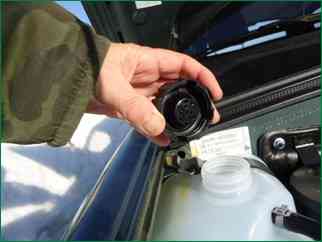
When in doubt, replace the plug.
Obviously, if the plug of the expansion tank is removed on an overheated engine and this action coincides with a “thermal shock” in time, boiling of the liquid and the formation of air locks in the cooling system will be guaranteed.
Once a year, wash the radiator cells with a high-pressure water jet (on a special washer), directing the jet first towards the oncoming air flow, and then in its direction to remove dirt, insects and road debris from the surface of the radiator.
This partially restores the efficiency of the heatsink.







